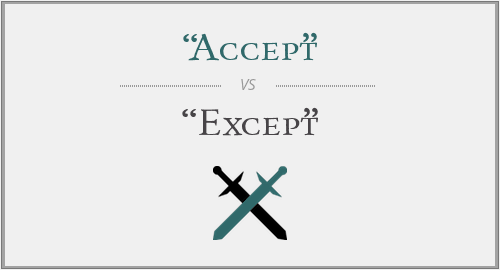The words accept and except are homophones (i.e. words with similar pronunciation butdifferent spellings and meanings) and they are commonly mistaken for each other. Below is theexplanation of each of these words along with some examples to help you learn the truemeaning and use of both words.
Accept as a verb:
The word accept serves a verb to describe a person’s consent or undertaking for a task or anobject. Accept is never used as a noun in English writing so one accepts a thing but one cannever have an accept on a thing. However, one must work hard for acceptance into a reputableuniversity. Here, acceptance is used as a noun but have the same meaning as that of accept.
Except as a verb:
The formal use of the word effect is as a verb where it represents the omission of something orsomeone from a group or a category.
In this example, the boss is calling everyone working for him liars other than the people whoare present at the time when he said it.
Except as a conjunction:
The almost similar meaning of except is assumed when it is used as a conjunction at the start ofa statement to form an exception to one just made. This is most confusing for beginners as themeaning of except as a conjunction and as a verb are same. A simple tip is when used asconjunction, except comes at the beginning of the statement and not anywhere in between orin the end.
Note here that except is at the beginning of the second clause forming an exception of nottelling her mother about anything but shopping.
Except as a preposition:
The most widely used form of except is as a preposition meaning excluding or other than.
In this example, except is used in the most simple and clear way which makes the readerunderstand its meaning and form very easily. Point to note here is that it can’t be like “heagreed to except last term” as it completely changes its meaning and is WRONG!
Accept or Except:
If you agree to receive something then you accept it (verb form). The CEO accepted themanager’s resignation. And if you consider something with the exclusion of one particularfactor than you are considering the whole thing except that one factor (preposition form). He was naked except for his socks.





Have a discussion about this article with the community:
Report Comment
We're doing our best to make sure our content is useful, accurate and safe.
If by any chance you spot an inappropriate comment while navigating through our website please use this form to let us know, and we'll take care of it shortly.
Attachment
You need to be logged in to favorite.
Log In